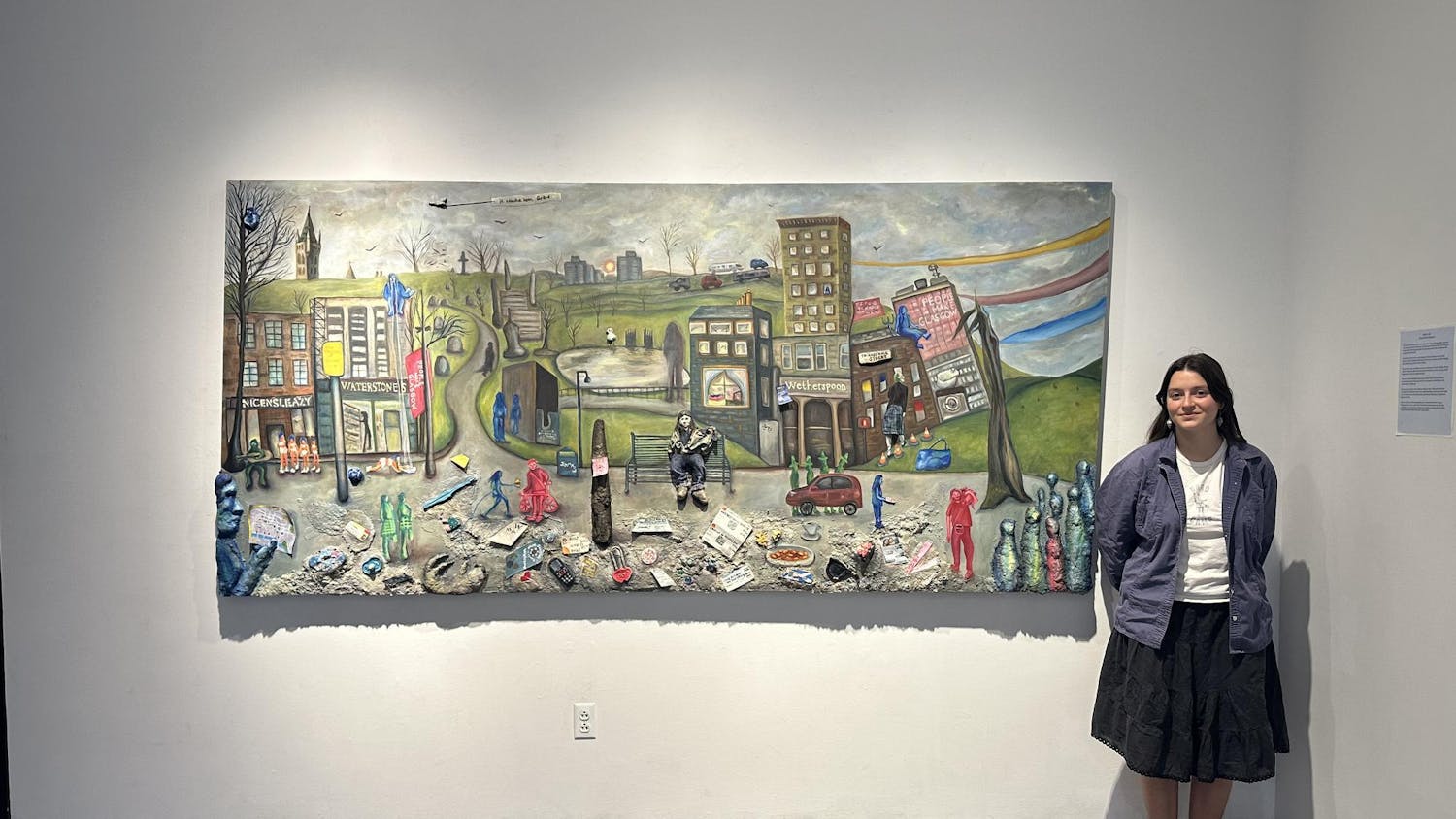Every Wednesday afternoon during the fall, there is a farmers market next to the Sciences Library and it’s the students who aren’t munching on a crisp, locally grown apple who stick out. On Thursday afternoons, students, faculty and staff alike walk down Brown Street, juggling both backpacks stacked with textbooks and bags brimming with fresh produce from Marketshares. And on Fridays, Morning Mail frequently features open invitations to the undergraduate community for free Shabbat dinners at the Brown/RISD Hillel.
Posters that mention food color the campus — “Have pizza with…,” “Food will be provided” or “Light refreshments to follow the event” plaster the walls outside Stephen Roberts ’62 Campus Center and academic department bulletins.
But for many members of the community, thoughts about food extend beyond thoughts of where to go to get it cheap — and, if they’re lucky, good. Phrases like “locally grown” and “food equality” are equally prevalent on campus and define initiatives in the University’s food sustainability movement.
Members of Brown’s Vegetarian Society and the Sustainable Food Initiative, both active presences in the sustainability movement on campus, appeared along with students and chefs from Johnson and Wales University Sunday at a Food Day fair held just down the hill in Burnside Park. Narranganset Creamery gave out samples of their locally produced dairy, Johnson and Wales students presented cooking demonstrations using entirely local ingredients and speakers discussed Providence’s local food and sustainability measures.
Sustainability: big word, big meaning
“Sustainability is three parts: environment, economy and equity,” said Rosalie Kissel ’17, co-head of SuFI, who was also present at the Food Day fair, adding that the environment portion of the term encompasses from where the food comes, to whom your money goes when you buy it and of what it is made.
Kissel said the club’s goal is to raise awareness about the impact of sustainability practices and to encourage undergrads to be more conscious of their food choices. Sustainable choices are empowering for the consumer, she said, adding that “eating locally” keeps a larger percentage of every dollar in the Providence community than eating goods imported from other areas.
“Food doesn’t just appear on your plate, which is a simple realization but not one that we always make,” she said. But “the movement is growing and becoming something that people actually care about,” she added.
Brown Marketshares connects consumers with farmers and provides them with fresh produce, as well as with bread, dairy and meats. Program Development Coordinator of Brown Marketshares Taylor Lanzet ’15 said the program did a survey that asked shareholders to choose from several options on why they invested in the program. The most popular response was “to support local farmers.” The second and third reasons were convenience and cost, she added.
“One of the biggest critiques of the local food movement is that it’s so expensive,” she said, but added, “Supporting your local farmer does not need to break the bank.”
Buying organic and chemical-free fruits and vegetables at the grocery store is often more expensive than buying through Marketshares, which runs for 11 weeks each season. The program offers subsidized shares to 37 percent of shareholders, and the amount of produce that you get for $220 can easily feed more than one person each week, she explained.
Over the past four years, Marketshares has had a resounding downstream effect — the program has spent over $750,000 in the local food economy, and this has had a $1.3 million impact on the economy by creating jobs and keeping farmers in business, Lanzet said.
The program has also created a community of people who are excited about cooking and more literate about food, she said.
Help from above
The University has responded to the momentum initiated by the undergrad community and is “doing something, but there’s still more to be done,” Kissel said.
Jasmine Fuller ’15, a member of the student composting group SCRAP, noted the University’s slow rate of change in comparison to increased student engagement with sustainability. SCRAP began the composting system at Brown in 2010 with 60 small compost buckets — now, the endeavor consists of 350 small buckets distributed among students and two three-bin compost centers on campus. But “student demand is at or exceeding (the) capacity” that SCRAP’s composting system can support, she said.
The club recently submitted an appeal to the Sustainability Strategic Planning and Advisory Committee — a student-proposed committee that comprises both students and administrators and was established in 2012 to handle the University’s sustainability plans — to introduce a campus-wide compost system, she said. If Brown were to successfully implement a campus-wide compost system, this would demostrate to Providence that such action is possible and could precipitate change for the city as well, she added.
While student groups may be frustrated by the slow rate of institutional change, Isabelle Aubrun ’16 said the University’s sustainability initiatives are more extensive than students may realize. But before she became one of two Brown Dining Services sustainability interns, she said that she, too, was unaware of these efforts.
The University’s sustainability project began in 2002 when students, University staff and the Rhode Island Department of Agriculture forged working relationships with small-scale farmers in Rhode Island and Massachusetts, who approached with worries about the financial viability of their trades.
In the early 2000s, Rhody Fresh, a local dairy producer, came to Brown offering to sell milk to the University but disclaimed that they did not have all the supplies and materials to do so. The University agreed to support them and today still buys all of its milk from Rhody Fresh, Aubrun said. Additionally, food scraps from dining halls go to a pig farmer at Two Village Farm, contributing to the “community ethic” on campus, she added.
“The hallmark of sustainability on college campuses is how a college campus can be sort of a microcosm for sustainability in other environments,” she said.
The University would benefit if it better promoted of its efforts in sustainability, Aubrun said. “The current mentality is that they’re doing it, and that’s the most important thing. But what they’re coming to realize is that it’s not quite as valuable if no one has a clue.”
Eat local food, and learn about it, too
In addition to the dining halls and the market, food conversation on campus also pervades the classroom.
“Sustainability seems to be one of the issues that engages the most people on campus,” said Ross Cheit, professor of political science and public policy, who will teach POLS 1740: “The Politics of Food” for the fourth time this spring.
His course examines the policies, institutions and interest groups that affect the way food is grown, eaten and distributed, he said. It mostly attracts students who are already somewhat engaged in food politics and challenges their initial beliefs, he added. “We have a fragile food system that is highly connected and international,” and this interconnectedness explains why so many people support buying local food.
“My course critiques this local food movement,” he said. “The desire to decrease ‘food miles’ — how far it travels — has taken too much importance at the expense of things more important,” he said, naming the energy cost of transportation as comparatively less significant than other concerns related to sustainability.
This year’s TRI-Lab initiative also features a lab entitled “Healthy Food Access.” It examines the policy, health and social impact of the current food system in Providence. Ben Chesler ’15, a TRI-Lab student, said he applied to take the course because it offers the opportunity to learn and simultaneously engage with the community. Chesler is a member of a group helping draft a policy for the R.I. Food Policy Council, while one of the other groups is working with the Providence ‘Fresh to You’ Market, he said.
“I think that generally, our generation is more and more aware of just how important sustainability is to our future,” he said.
The grass is green off the hill as well
Undergraduate interest in food sustainability extends beyond the Van Wickle Gates — it reaches farther than the city of Providence, and it interests a population larger than the 6,500 20-somethings on campus. John Eng-Wong ’62, special advisor to the American studies masters program, said the University’s effort to become more involved in local food sourcing and sustainable practices mirrors what many others around the world are trying to achieve in regard to food.
Eng-Wong organized a conference between national and international scholars named “Food Heritage, Hybridity and Locality” from Oct. 23 to 25. The conference attracted not only Brown undergraduates and professors but also scholars from the New England area and abroad, he said.
“Fifty years ago, it wouldn’t have been respectable for us to look at food as a topic of study,” he said, but today both in the U.S. and internationally, there is a higher awareness about what we are eating. Twenty years ago, he helped initiate the Providence Farmers Market that now visits campus weekly throughout September and October.
“I’d say about 85 percent of people who come, come for sustainability,” said Georgina Sarpong, who works with Farm Fresh Rhode Island and helps run the market. “I think that everyone that we have encountered at this market has a strong interest in sustainability.”
Students, too, are hopeful for the changes they will be able to make through engagement with their peers. “There are a lot of groups who are working on distinct things, but we are all just one piece of the sustainability puzzle,” Aubrun said.
“Food has serious potential,” Eng-Wong said.

ADVERTISEMENT




